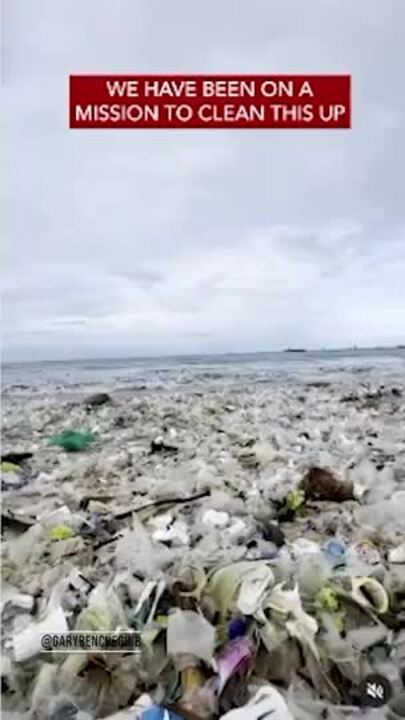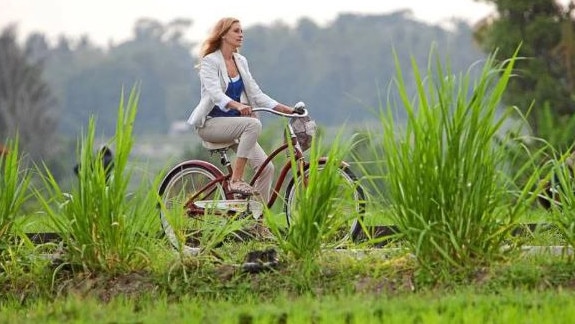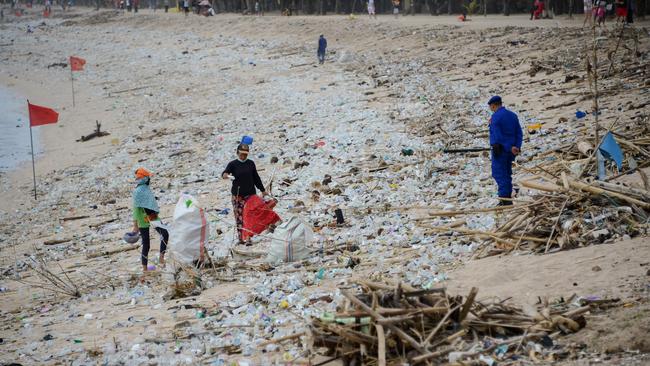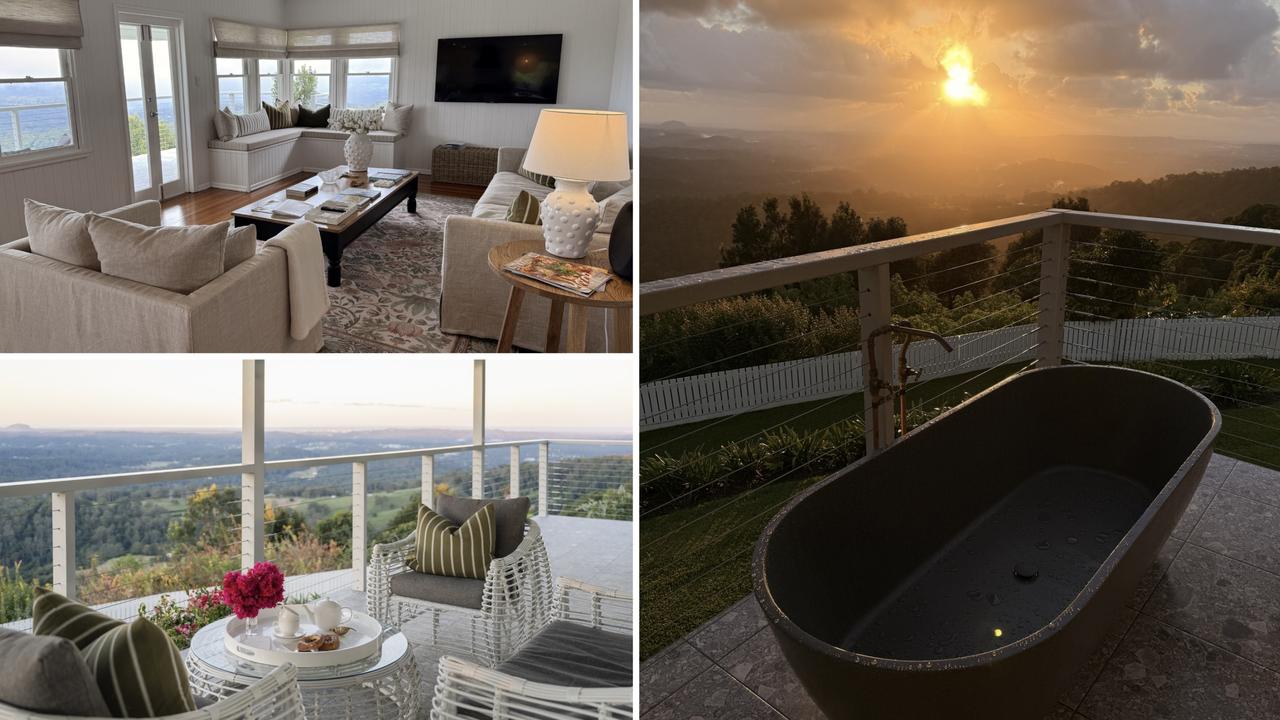Angela Mollard: Australians are stakeholders in this Island of the Gods we have loved to death
Bali, the holiday island adored by Australians, has been, literally, loved to death, writes Angela Mollard.

Lifestyle
Don't miss out on the headlines from Lifestyle. Followed categories will be added to My News.
Perched on a hill looking out to Bali’s famous Mount Batur there’s a tiny yoga studio I return to every year.
I’ve watched the sun rise and set in that little open-air shala, learned the breathing that is the essence of this ancient practice and grimaced when required to remain in the chair pose too long. I’ve inhaled the scent of frangipani, watched butterflies flitter and dragged both my bloke and daughters there to experience the magic.
This week I’ve been here again, attempting to stretch my body and still my mind as the tropical storms rolled in. But it didn’t work. Bali used to make me happier than almost anywhere on the planet. Now it makes me sad. After 30 years of visiting, I won’t be coming back.
This unpretentious island full of easy, gentle people is broken. Dirty, dysfunctional, overcrowded and suffocating under a rubbish pile it lacks the wherewithal to eliminate. The holiday island adored by Australians has been, literally, loved to death.
Traffic in the busiest parts of the island is at a permanent standstill, roads, paths and balconies are more hazardous than ever, construction noise disturbs the peace and litter floats in every waterway from puddle to ocean. Some parts, particularly Canggu, Seminyak and Uluwatu, are so Bondi-ified that if you close your eyes you’d swear you were in Sydney’s eastern suburbs. The coffee is the same price and in the influencer and Russian-ridden enclaves you can’t find a rice paddy or a nasi goreng for love nor rupiah.

I didn’t want to believe it when the travel institution Fodor’s placed Bali top of its “No List” for 2025. Surely there were worse places? Barcelona, where locals are aggressively turning against tourists? Mt Everest, where vanity climbs have become a sport for the rich? Santorini, where the glorious blue and white visage is blocked by swathes of humans?
But no. Beautiful, temple-dotted, incense-scented, smile-guaranteed Bali is most at risk of over-tourism. Fodor’s, which does not advocate boycotting destinations but raises awareness, pulled no punches. “Rapid, unchecked development spurred by over-tourism is encroaching on Bali’s natural habitats, eroding its environmental and cultural heritage and creating a ‘plastic apocalypse’.”
As I write this, I’m sitting on a balcony at Nusa Lembongan, 30 minutes by boat from the main island. We started coming here to escape the bustle of Bali but this time my stomach turned as we arrived on this once pristine island. The aquamarine bay is littered with plastic bottles, straws and plastic packaging while three recycling bins on the beach remain unused.
When my partner went scuba diving to see the manta rays, he came back so distressed by waste plastered against the coral reef and microplastics being ingested by the filter-feeding creatures that he declared he’d never go diving here again. Bans on single-use plastics are clearly failing.
Over Christmas Bali was swamped by the worst tidal wave of rubbish the island has reportedly ever seen. Local recycling group Sungai Watch worked round the clock to shift the waste but the problem remains: There is not the leadership, commitment or funds allocated to make a difference. As a well-placed source told me, even front-footed recycling companies such as Re>Pal working tirelessly in the region face apathy by government, greenwashing by fast-moving consumer goods producers, and lack of investment and partnership with large foreign multinationals. Those invested in a cleaner Bali fear tourists will give up on the island before the situation can improve.

Perhaps we should leave the Indonesians to solve their own issues but with Australians making up the greatest proportion of Bali’s 6.3 million tourists last year, we are arguably stakeholders in this Island of the Gods. We’re certainly sufficiently invested to ask the questions.
Questions like why a building ban in Bali’s busiest areas has not yet been implemented despite plans for it to begin last October. A two-year moratorium on the construction of hotels, villas, nightclubs and restaurants would allow authorities to take stock. What’s the alternative? A temporary ban on visitors like The Philippines instituted on the island of Boracay in 2018?
And what about the $A15 Bali tourism levy instituted last February? A year on, where has that money been directed? The Bali Sun reports that 60 per cent of international arrivals have been dodging the fee and there has been no meaningful change or documentation as to how it or the mandatory Hotel and Restaurant Tax (PHR) have been reinvested on the island.
I’ve loved Bali since I first came here in 1992. I’ve watched its people artfully adapt from growing rice to working in hospitality, always kind, always with grace. And so while I will stop visiting Bali, I refuse to give up on this precious place and will instead contribute to my friend Made Astawa’s recycling program in his village, Pesalakan, east of Ubud.
We met more than a decade ago when he drove me on a solo trip and he’s passionate about ridding his island of rubbish. I hope Bali sorts itself out before tourists give up on it for good.
ANGELA LOVES
Uplifting story
It’s nearly 50 years since the birth of the first IVF baby and Joy (Netflix) chronicles the determination and opposition faced by the brilliant scientists. Bill Nighy and young NZ actor Tomasin McKenzie are superb.
Novel flair
Sometimes you just need an easy read and Lisa Jewell’s None Of This is True, about two women whose lives become entwined, is addictive and full of twists.
Op-Shopping
Best time of year to pop in with everyone cleaning out their cupboards over the summer break. I’ve spent this week in a gorgeous orange and white kaftan from the Salvos that cost me $6 despite being unworn and sporting an original $50 price tag.
More Coverage
Originally published as Angela Mollard: Australians are stakeholders in this Island of the Gods we have loved to death





